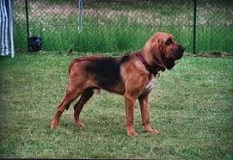The Bloodhound (also known as the Sleuth Hound or the Saint Hubert Hound) is clearly one of the most well-known breeds of dogs on the face of the Earth. Think of the following characters and try to find out what they have in common: Pluto, Trusty from Lady and the Tramp, Napoleon from The Aristocats, and Bruno in Cinderella? That is right, they are all bloodhounds.

The St. Hubert, the grandfather of this scent-hound, is known to have been bred almost one thousand years ago, in France. The first references to the actual Sleuth Hound dates back to England, around 1350 and this dog has been documented ever since. Also, from earliest times, it has been known for its great ability to track both animals and humans.
The Bloodhound is a scent-hound originally bred for hunting wild boar and deer, and later on for tracking down humans. The nose of this dog is extraordinary, as it can distinctively remember the scent human after several days, across water, over very long distances.
They usually weigh around 85 to 110 pounds and can reach heights of up to 27 inches. Their life expectancy is around 10 years. Their hard coat can be red, black, liver or tan. The bones of this hound are very thick.
Even if they are usually gentle, they go to great lengths to follow a scent when they are on the job, without resting one bit. These dogs have a very strong will and, because of their work-related stubbornness, they can sometimes be a little hard to train. The Bloodhound makes a great family pet and it can show intense affection towards all family members.
Even if their estimated lifespan is, as mentioned above, around 10 years, a study conducted in 2004 by the United Kingdom KC indicated a shorter longevity, just slightly above 6.5 years. Around 80 dogs were monitored, out of which one third died because of bloat and a quarter because of cancer. Compared to other pure breeds, the Bloodhound has quite a lot of numerous specific illnesses, bloat being the most common. Other common illnesses can affect their eyes, skin and ears. This is why owners of this breed must be very attentive to these types of conditions; they must take their dogs to constant medical inspections and try to prevent bloat by specific diets.
These dogs are very good-natured, being lovable and good with other animals and children. They love attention and are devoted, though sometimes a little timid. Even if they have very much energy, especially as cubs, they can become wonderful companions with a little training. The ideal home for such dogs would be a place with a yard, but an apartment can do if you grant them the daily exercise time (do not give them the chance to wear themselves out, as they will surely do it!). Again, to prevent bloating, make sure you do not let them run or walk too much for one hour before and after meals.
There are many arguments that could convince you to choose this dog. As maintenance is also quite simple, you have another reason to consider the Bloodhound as a great pet for you and your family, whether you live in an urban or rural area.




